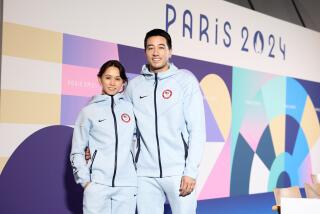Tonya vs. Nancy: Choosing Your Side Can Be Revealing : Sports: Harding fans empathize with her need for recognition, analysts say. Kerrigan’s admire hard work.
Tonya or Nancy?
It will be a simple choice for Debbie Longo. “I’m rooting for Nancy,” said the 21-year-old Citrus Community College sophomore who once dreamed of being an Olympic equestrian but now tries to content herself with breeding horses. “You work every day to get a gold medal and someone comes and bashes her leg in--and she still didn’t give up. . . . When that happened to her, I knew that feeling: to have your dream shattered.”
Sandy Clever is just as sure of her favorite. “Tonya,” said the 28-year-old office manager from the Northern California town of Sunnyvale. “That’s how I was--very bad, very black sheep of the family, trying to show yourself and get some attention.”
In the annals of sports rivalries great and small, Ali versus Frazier, Magic versus Bird, the Yankees versus the Dodgers, Chris Evert versus Martina Navratilova, the L.A. Raiders versus anyone, today’s matchup of Nancy Kerrigan versus Tonya Harding ranks as a classic exercise in choosing sides.
Perhaps not since after Giant pitcher Juan Marichal whacked Dodger catcher John Roseboro on the head with a bat in Candlestick Park in the summer of 1965 has there been such anticipation to see what would happen the next time two warring athletes--linked uncomfortably by a shocking act of violence--ventured again within a sporting arena. (When the two baseball players did meet again, nothing happened.)
The global village, it seems, is divided into cheering sections--and whom you back may say more about you than it does about either of the skaters in the spotlight. When it comes time to choose between Kerrigan and Harding, most people will choose their soul mate on ice.
“Someone said life is like an inkblot upon which we project all of our unfulfilled secret needs and fears,” said psychologist Chaytor Mason, professor emeritus at USC. “That’s exactly what’s going on here.” The Tonya people, he speculated, “are projecting their own unfulfilled needs for recognition, the 15 minutes of fame . . . for the times when even though they worked hard at the company they were unrecognized and some pretty young competitor got all the glory. They’re projecting onto this situation.”
And the Nancy people: “They’re the Mr. Rights or the Ms. Rights. They do things right,” Mason said. “Certainly the Tonya people are more noticeable. But I would say in the long run, probably there are more Nancy people. Most of us do believe in playing the game by the rules and making a success by sheer hard work.”
As television executives eagerly await a viewing audience of Super Bowl proportions for tonight’s technical program--better known as “the showdown in Norway”--no consensus has emerged over the image in which to cast these two athletes: Kerrigan is the victim of a vicious attack or the beneficiary of unearned media attention. Harding is the beleaguered, hard-fighting underdog or the devious, unsporting competitor.
But the urge to weigh in has been irresistible, attracting pundits from all over the world.
“A lot us have had some Tonya in our lives,” said the Rev. Jesse Jackson. “We have known some rejection . . . some misunderstanding. . . . All the stuff we know about esteem-building, she’s not had much of that. And yet in spite of that, she keeps smiling on the outside and skating at the highest levels. And her insides must look like shattered glass.”
Jackson diplomatically declined to take sides. “I obviously hope both do well,” he said. But his compassion for Harding is unquestionable. “Whether it’s Tupac Shakur or Mike Tyson or Tonya Harding, these children were not born this way. . . . Let’s have some sense of correction and redemption and mercy toward them.”
Others are less diplomatic. “Tonya’s like me,” Democratic political analyst Bob Beckel quipped breathlessly on “CBS This Morning.” “She takes no prisoners.”
Her appeal, in fact, seems not unlike that of the Raiders, those bad boys of the silver and black.
Psychologist Mason said: “The people who wear Raider caps, they’re largely toward Tonya. They believe they’ve been deprived, they have been denied their rightful place in the world.”
On the other side are the people who deplore the Raiders. “I am psychologically and morally incapable of rooting for the Raiders,” said screenwriter Marshall Goldberg, who grew up in Pittsburgh but has lived in Los Angeles for 15 years. “The Raiders were scum--on their best days. They were always dirty. They cheated.”
And for people such as Goldberg, who are incensed by injustice--”I was 17 when Martin Luther King marched in Washington”--the specter of Harding on the ice is shameful.
“People don’t expect to be treated fairly in their own lives,” Goldberg said. “But they can’t stand seeing someone else not treated fairly. Particularly someone who played by the rules. And I think Nancy Kerrigan played by the rules. . . . Tonya Harding represents whatever you can get away with (is) OK.”
At the same time that Kerrigan is perceived as a victim, she is also perceived as a winner. After all, look at what she’s already won: seven figures worth of endorsement deals, a post-knee-whacking ice-skating television special that aired prior to the Olympics, and, of course, that bronze medal she took home from the 1992 Olympics.
“If there’s one thing people in this country love, it’s a winner,” said Brian Murphy, publisher of the Sports Marketing Letter in Westport, Conn. “People want to be winners, they admire what it takes to be winners.”
That explains some of the appeal of the Dallas Cowboys in last month’s Super Bowl--even though they were matched against a team that might have been expected to attract the sympathy vote, the oft-disappointing Buffalo Bills. “The Cowboys have a long tradition of winning even though the Bills were the underdogs,” Murphy said. The same may go for the figure skaters: “People may be giving Kerrigan an edge because they see her as a winner. People may be looking at Harding’s troubles on the ice and not necessarily see her as a winner.”
There are differences in their skating styles--Kerrigan is more balletic, Harding is more athletic and famous for (sometimes) landing the triple axel--but they count far less than personality, it seems.
When Yankee teammates Mickey Mantle and Roger Maris were in neck and neck competition to break Babe Ruth’s single-season home run record in 1961, most fans were rabidly supporting Mantle. “He was a familiar face, the fans had been with him, they had suffered through his highs and lows, and they wanted him to do it,” Murphy said. Maris, on the other hand, was newer to the Yankees, younger and “didn’t fit into (the fans’) image,” Murphy said. “He didn’t fit into their image by not being Mickey Mantle. And that was about as unfair as anything could get.” In fact, Maris broke the record and was emotionally crushed by the fans’ resentment.
In the case of Harding and Kerrigan, some are disdainful of the media spectacle and choose neither of the above. What about the other skaters? What about Bosnia?
“I’d actually like someone from, like, Slovakia to win,” said Eric Gregory, 30, as he stood in the Santa Monica sports bar Legends recently, watching a truly passionate rivalry play out. On the television screen was the Indiana-Purdue basketball game.
“This is a rivalry because there’s respect--both teams are really good,” said Gregory, an Indiana alumnus. “Tonya Harding doesn’t have a leg to stand on--no pun intended.”
An air of good old American cynicism has crept in. “Kerrigan seems to be kind of distant and remote to me--the kind of girl who would break up with you long distance,” comedian Jeff Cesario said. “Tonya Harding would break up with you by dousing your car with lighter fluid and setting it on fire.”
But even when you don’t like them--and Donna Fisher, 34, swears she is not fond of either--you’re inexorably drawn into the drama. “I identify with Tonya,” Fisher confessed as she paused on a recent visit to Universal CityWalk. “I got kicked off the cheerleading squad in high school. When I heard Tonya might not get to go to the Olympics, I thought, ‘My God, it’s me all over again!’ ”
This is one of our great “public dramas,” as psychologist and lawyer Rex Beaber puts it. “I think Americans maybe uniquely have an incredible lust for direct confrontation,” Beaber said.
“The greatest disappointment to the American public would be if these people performed 8th and 12th respectively. What the American people want is 1 and 2 respectively. There’ll be a lot of disappointment if one of them messes up spectacularly and there isn’t a close competition. What they want is a 10-round fight.”
* RELATED STORIES: C1, C7
More to Read
Go beyond the scoreboard
Get the latest on L.A.'s teams in the daily Sports Report newsletter.
You may occasionally receive promotional content from the Los Angeles Times.











